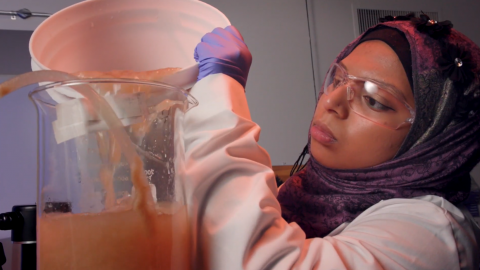Degree at a glance
Customize your education
Select your academic focus area
Areas of emphasis
Culminating experience
Research and present a master’s thesis
Student projects
Tuition & funding support
$20,850 for annual in-state tuition and fees
Funding support
Careers
1:1 career advising and internship support
Career support
Degree requirements
A 21-month, 62-credit thesis-based degree program for students who want training in academic research. Students have the opportunity to work with faculty across multiple disciplines including environmental public health, toxicology, occupational health, climate change and more.
Core courses
This degree requires 23 credits in core coursework, 10 related to your thesis, and 29 additional elective credits.
Student stories

Aesha Mokashi
DEOHS MS student Aesha Mokashi works with King County and Afghan Health Initiative to reduce children’s lead exposure in local Afghan communities
LEARN MORE
Yoni Rodriguez
DEOHS grad student Yoni Rodriguez wins Latino Center for Health Fellowship
LEARN MORE
Daaniya Iyaz
DEOHS grad student Daaniya Iyaz studies how wildfire smoke impacts kids’ health
LEARN MOREAreas of emphasis
Areas of emphasis are recommended elective selections to achieve core competencies that will set you up for your future career. They are not required and do not appear on your transcript.
Recent student projects
Niloufar Ghodsian
Health effects of exposure to cannabis in workers in an indoor growing facility
MS (Thesis) | Exposure Science (ES)
2019 | Christopher D. Simpson
Seth G. McGrew
New insights from a study of chlorpyrifos toxicology in humans
MS (Thesis) | Environmental Health (EH)
2018 | Lianne Sheppard
Tuition & funding support
- Traineeships, fellowships, research and teaching assistantships and other funding opportunities can help students reduce costs of attendance.
- MS and PhD students from 16 Western states and territories pay in-state tuition.
Career support
DEOHS’s dedicated internship and career services manager provides DEOHS graduate students with:
We offer our students 1:1 career counseling.
Learn more
- Personalized, one-on-one career advising for current students and recent graduates.
- Help with finding internships and jobs.
- Career development workshops.
- Networking opportunities.
- Employer information sessions with representatives from industry, consulting, government agencies and advocacy organizations.
- Access to a LinkedIn networking group, internal internship boards and public health job sites.